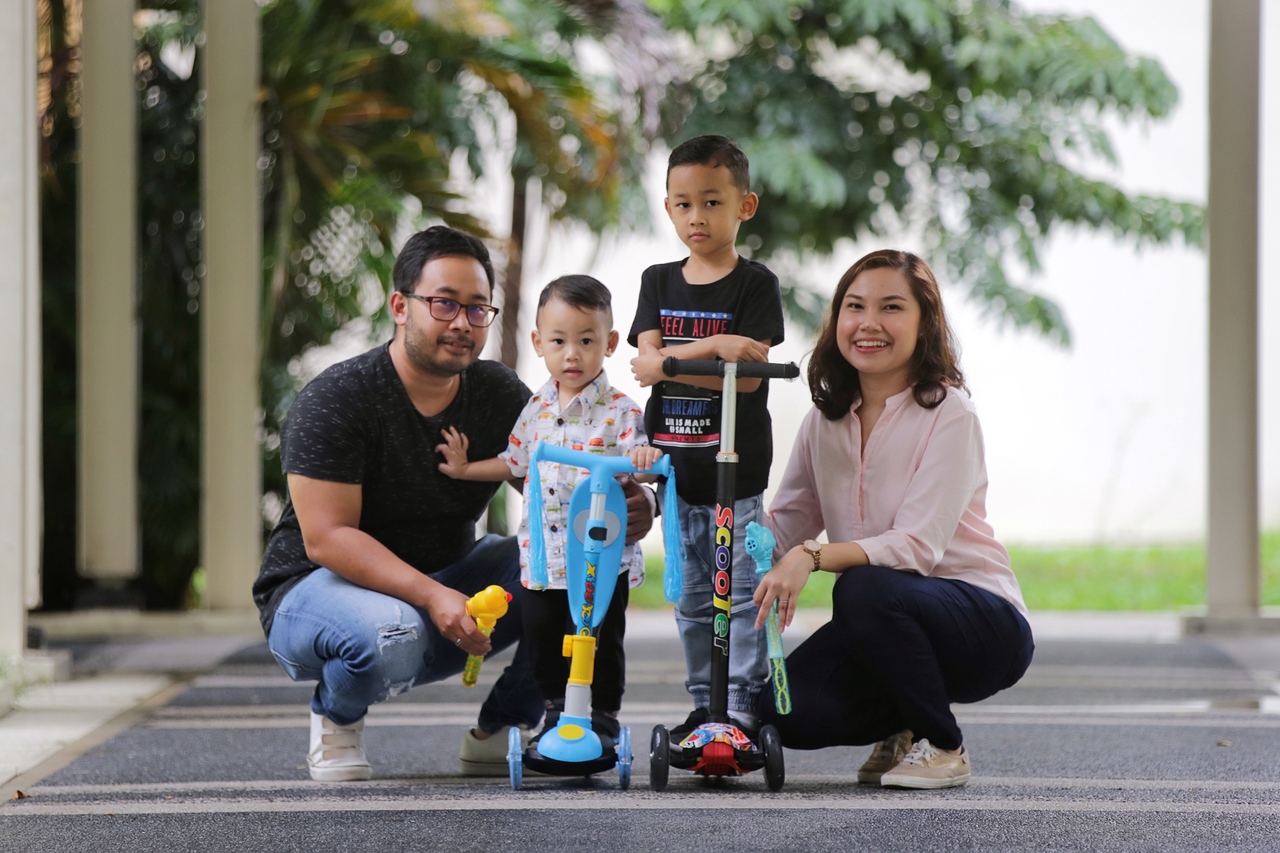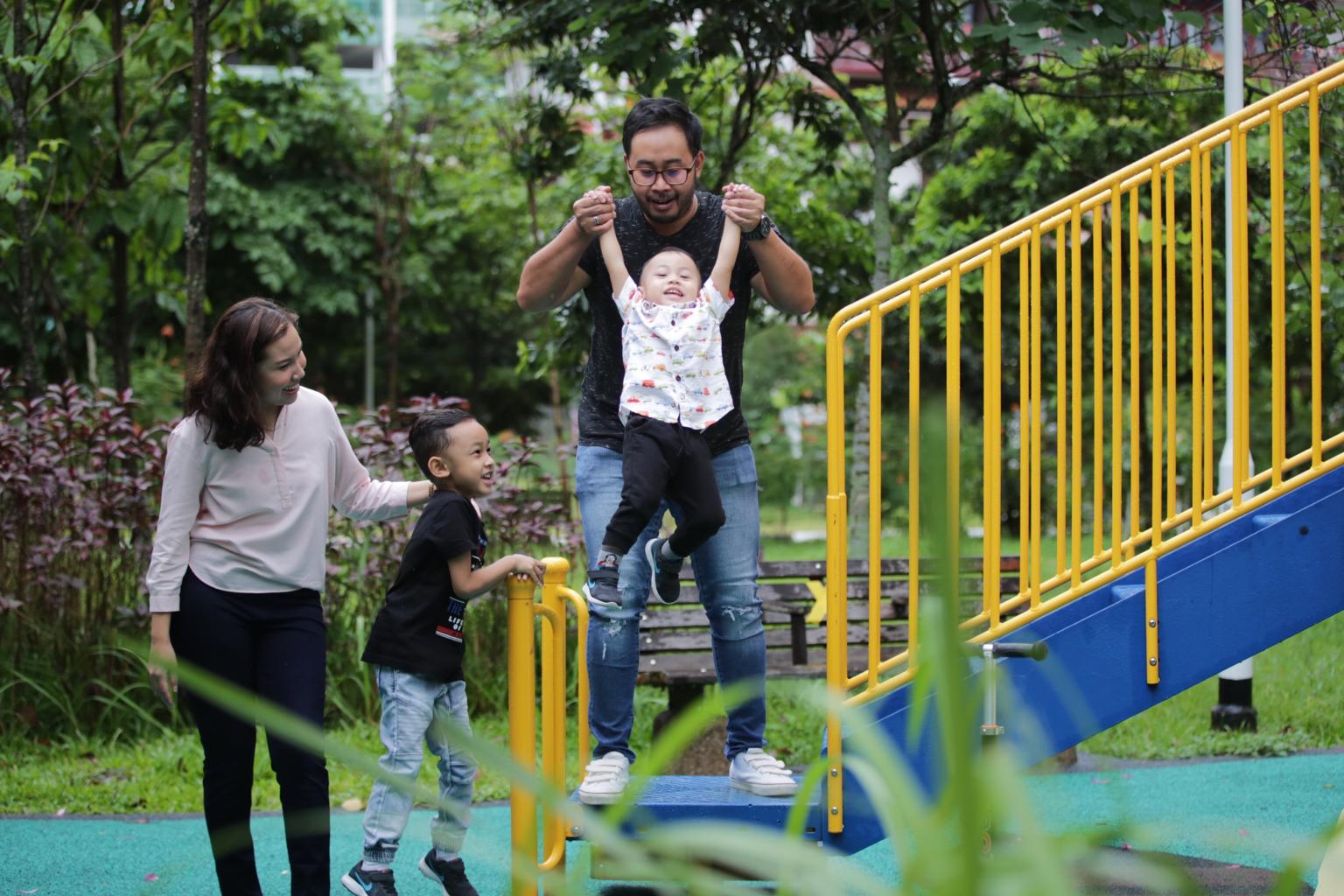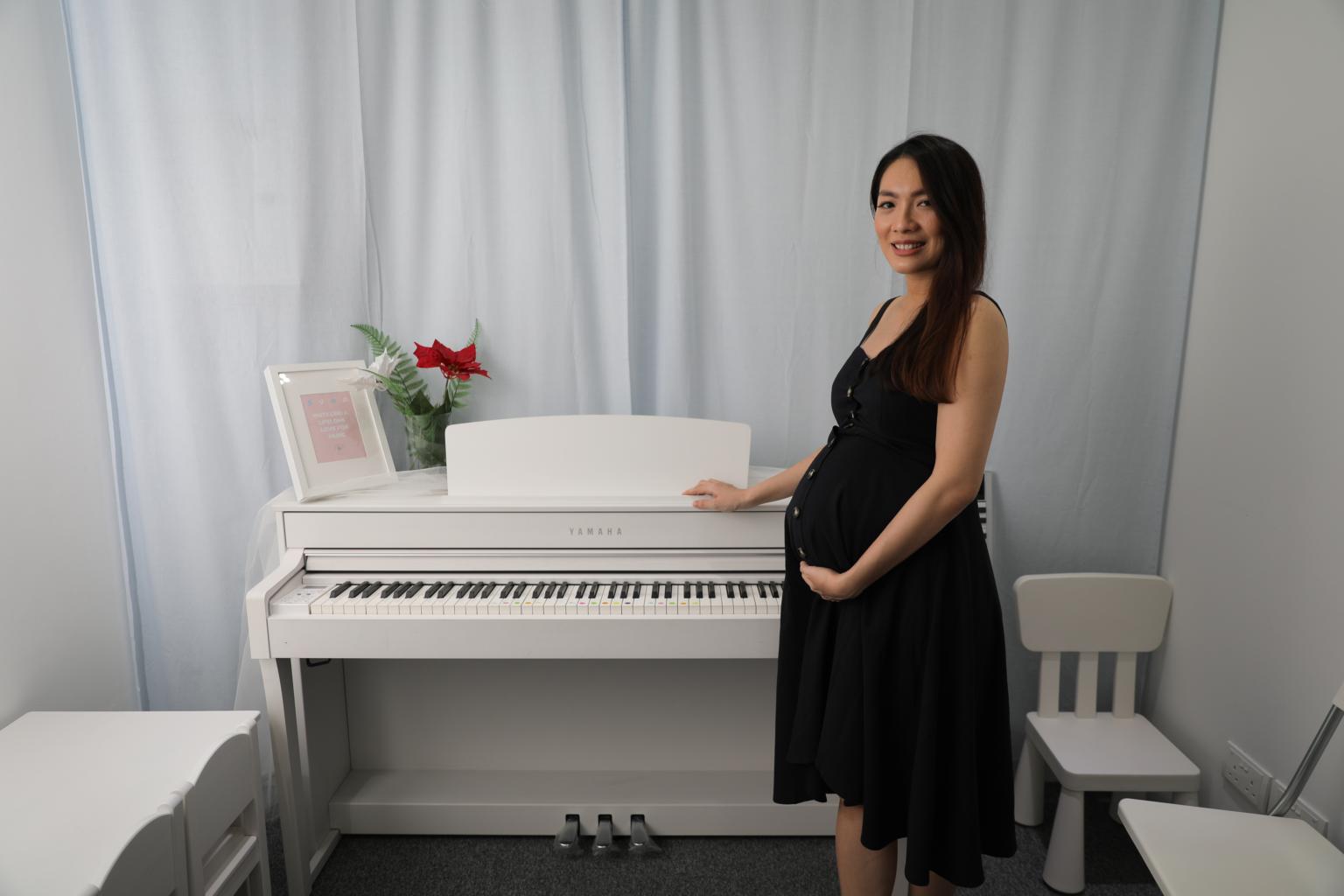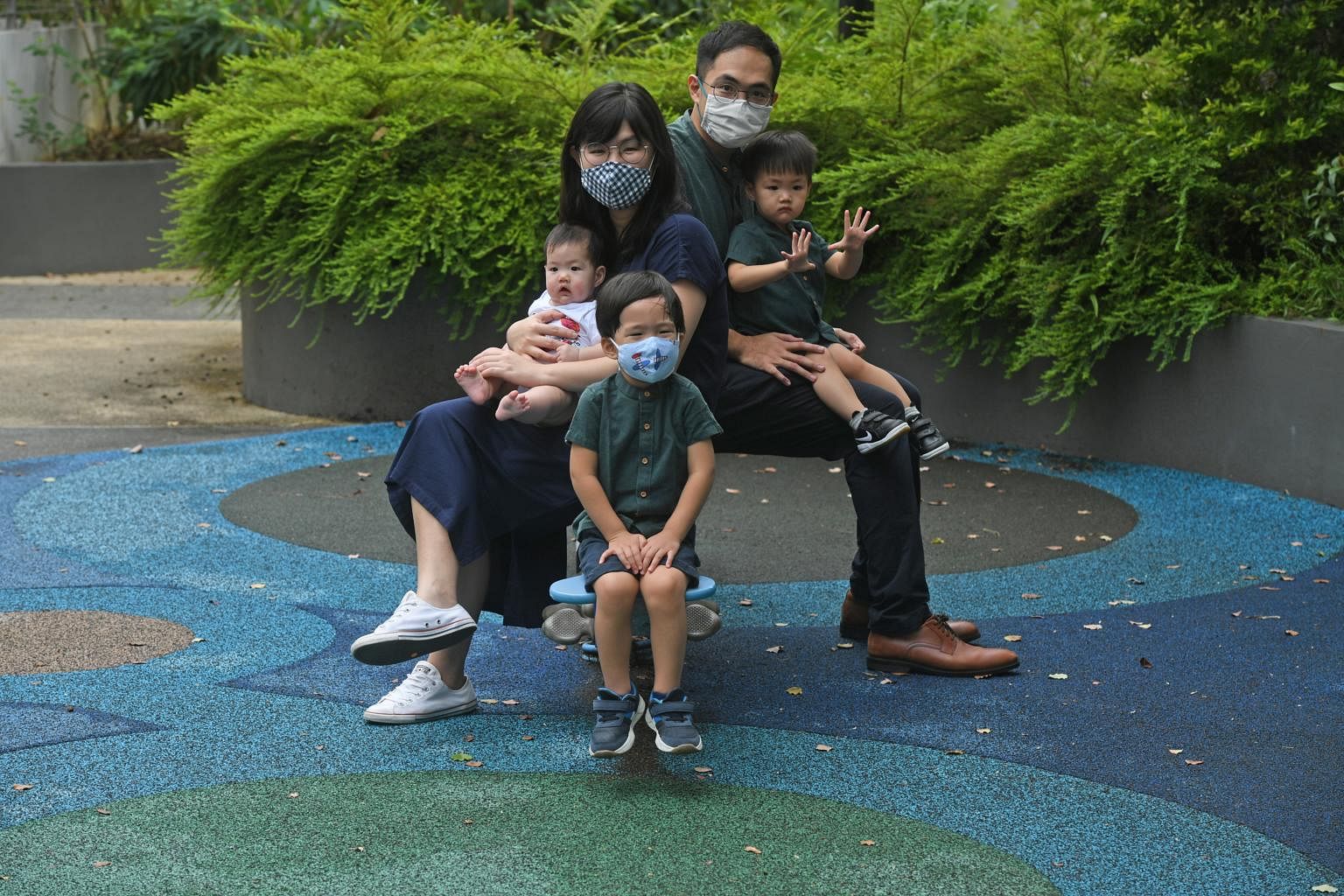Teachers' Day 2020: Celebrating the unsung heroes of Covid-19
Sign up now: Get ST's newsletters delivered to your inbox

Senior Educational Therapist Sofia Bte Abdollah (right), (from left) her husband Operations Manager Juandy Bin Samsuri and their children Harel Bin Juandy and Elham Bin Juandy.
ST PHOTO: GIN TAY
SINGAPORE - For the first 12 days of the circuit breaker, Ms Sofia Abdollah, 31, could not leave her master bedroom.
Her young children wailed outside, frustrated that Mummy was so close yet so far away, but she had no choice. She was under quarantine.
The senior educational therapist with the Dyslexia Association of Singapore (DAS), a social enterprise, was shocked when a colleague tested positive. As they had been in close contact, she was told to isolate herself from April 7 to 18.
She used the master bedroom in her four-room flat in the north-east because it had an adjoining toilet, and had to take her temperature thrice a day during video calls with Health Ministry officials.
In their living room, husband Juandy Samsuri, 38, an operations manager, set up a tent where he slept with their kids, Elham, 5½, and Harel, then almost two.
"The kids wanted to barge in. They would knock on the door and my husband would have to explain to them. I was also on the video call telling them, 'Mummy cannot go out because Mummy could be sick.' It took a lot of pacifying and encouragement," she remembers of the ordeal.
As the family and their helper counted down the days to her all-clear, subsisting on tingkat meals as they did not want to venture out, Ms Sofia found herself directing her elder son Elham's K2 home-based learning via video calls, while her supportive husband executed her instructions.
She also appreciated the efforts of her peers in the industry, as her son's teachers called every day to check on his health and well- being.
After her "me-time" during quarantine, she struggled with working from home as her kids, especially toddler Harel, would disrupt meetings. She recalls an incident during a parent-teacher session when he interrupted and demanded milk.

Pivoting to fully digital learning had its challenges, too. Ms Sofia teaches the Main Literacy Programme for primary and secondary school students and found that maths lessons were particularly tricky.
Unable to use manipulatives to help students learn abstract mathematical concepts in a concrete way, unlike in a classroom, she had to use apps and online tools as replacements.
This meant spending her days off familiarising herself with them before introducing them during class. As the lines between work and home life blurred, it felt "as if I was working throughout" the circuit breaker.
She also took on the unpaid role of tech support for grateful parents who were unfamiliar with computers, helping them outside of her teaching hours.
"Some even asked me, 'Where is the Start button?'" she says, chuckling.
It was, however, rewarding to see her students express themselves freely during their sessions, as they could not do so during their school e-learning classes, which tended to be more results-driven.
"They wanted to tell me how their week was, how stressed they were," she observes.
Parents, on the other hand, were thankful for the DAS classes because "there is someone monitoring the learning and there are pep talks to keep the children motivated and positive throughout the circuit breaker".
Her own quarantine episode has taught her not to take good health for granted and never to shrug off flu-like symptoms.
At the same time, she realised that she had been missing her own children's milestones while busy cultivating her students' potential.
For one thing, she assumed that Elham could read only a few words until he showed off his skills during the circuit breaker.
"He was reading the whole book. I was amazed," she recounts with pride. "It was eye-opening for me, so now I try to spend as much time as I can with my own kids."
The best Teachers' Day gift in this pandemic year: "Stay in the pink of health, limit going out as much as possible and spend time with your family at home."
International school teacher had to teach in another time zone
How do you teach online during the circuit breaker when your student cannot sit through e-lessons because of health reasons?
Mrs Srishti Srivastava Pingali had to react fast. Her eight-year-old student had severe myopia and screen exposure gave him headaches, so he could manage only 20 minutes of screen time a day.
The Grade 2 homeroom teacher at Middleton International School in Tampines allowed him to turn off his screen during live lessons and even delayed deadlines for written assignments so his parents could help him after work and on weekends.
"It was learning on the go," the 42-year-old says of her home-based learning (HBL) journey. She teaches all subjects except specialist ones like art.

"We had never taught online before, students did not have adequate exposure to digital literacy and parents had never experienced anything like this either."
Middleton ran full HBL classes for five weeks from April 13 to May 15, followed by a two-week holiday. For most of June, it alternated between weeks of classroom learning and HBL, before another term break of three weeks.
Apart from the pedagogical and technical issues - Mrs Pingali once found herself kicked out of her online class and her students thought she was pranking them - there were plenty of emotional challenges to deal with, too.
A student's family was split across countries as one parent could not return to Singapore on time, so she had to conduct HBL across different time zones. Online farewells to expatriate classmates returning home were teary-eyed but disconnected affairs.
As young children are not able to express their emotions about the pandemic well, the school's grade level team introduced stories such as The Giving Tree and Munna And The Grain Of Rice. They helped the kids talk about their feelings about Covid-19 and encouraged empathy.
Mrs Pingali admits she struggled with "the feeling of not doing justice to home or work" with so much on her plate. But being open and honest about her dilemmas with her kids, Eklavya, 13, and Veda, 11, paid dividends, as they ended up teaching her how to edit videos and create digital content for her classes.
Meanwhile, husband Sridhar Pingali, 44, who is self-employed, was her "rock" during the strenuous weeks of HBL.
One unexpected reward of the pandemic was bonding with her students' families as parents stepped up.
"The understanding and empathy that came with the awareness that it was a new way of learning and teaching for all of us, and that we were bound by the common goal of looking out for our children, was something that blew me away."
The best Teachers' Day gift in this pandemic year: "Parents and teachers developed a great partnership through the HBL to see the children learn and grow. I would want this partnership of trust to continue to grow.
"On a more materialistic note, a box of chocolates to share with the bunch that makes me love my job so much would be great."
She gave piano lessons through Zoom
Ms Joyce Yeo, 31, was so busy running her piano studio, JoyWaltzAcademy, that she worked seven days a week.
Her five-year-old social enterprise had taken over an adjoining unit at Midtown mall and was poised to open on April 1.
The last piano she ordered arrived on March 25. The very next day, enrichment centres were forced to close under pandemic safety measures.

Her most immediate challenge was transforming how the high-contact enrichment genre was taught, as well as changing mindsets.
"We were all not used to it. Piano-playing is traditionally something that you have to do physically. A lot of parents didn't believe that we could actually do it online," she recalls.
Fortunately, her teachers were as adept with laptops as they were with keyboards.
Ms Yeo, who has a degree in banking and finance, but chose to pursue her passion for teaching, had designed a curriculum for children as young as three.
It is delivered via digital resources so children would be able to learn the instrument in an age-appropriate and engaging manner. Her school uses a compact roll piano instrument that is affordable and suitable for home practice.
"The lesson materials were already online, so we could just share the screen with the children and watch them play. The difficulty was mainly with the technical issues," she says, recounting that her team had to help parents with Zoom hiccups in the early days of the circuit breaker.
About 70 per cent of her 350-strong enrolment suspended lessons during the circuit breaker, but those who chose online lessons "gave really good reviews", she says.
Now that classroom lessons have resumed, most of her pre-circuit breaker students are back, with about 10 per cent choosing to continue e-learning exclusively and some choosing a blend of online and classroom learning.
The new studio extension came in handy as the extra space allowed her to accommodate a 20 per cent increase in students to 430 today. She was also able to hire one new teacher from a music school that had closed down.
JoyWaltzAcademy's programmes at 25 pre-schools, local primary schools and international institutions were also suspended during the circuit breaker, with only eight resuming lessons so far in phase two.
The three-month "forced rest" did her a lot of good, as she was so stressed earlier this year that she did not realise she was pregnant until two months later in February.
Now in week 36 of her third trimester, she had used the down time to do prenatal yoga at home, walk her dog and enjoy the tasty claypot chicken that husband Desmond Chua, 34, who works for a technology company as head of Asia Pacific, whips up.
"I took it as a blessing even though there was all this stress about how the business was going to survive," says the entrepreneur, who offers subsidised lessons to low-income children and employs a hearing-impaired staff member.
The pandemic's devastating casualty rate has made her reassess her priorities even as she hands over work responsibilities to concentrate on her baby's birth early next month.
"No matter how successful you are, when you don't have your health and you don't have people around you, it just doesn't make any sense."
The best Teachers' Day gift in this pandemic year: "The kids always give us customised bottles with our names. They're so adorable when they give them to you because they want you to be surprised and excited. But to us, (the best gift) is them being safe, happy and healthy, and not restrained by what's going on around them."
Juggling extra workload, a newborn baby and HBL for his own kid
"Cher, what's the noise outside? Is someone crying?"
Mr Andy Wang smiles as he describes the puzzled faces of his students - the term "Cher" is an affectionate nickname for teacher - while he conducted lessons online during the circuit breaker.
Beyond the closed door of his study room, his wife Ms Grace Oh, 30, a social worker, pacified their newborn. Their eldest child, Samuel, three, was quarrelling with his brother, Ethan, two.
Life under lockdown was anything but peaceful.
"Everything just happened together at one go," recalls Mr Wang, 33, a lead educational therapist who has been with the Dyslexia Association of Singapore (DAS) for eight years. The social enterprise helps those with learning difficulty and other learning differences.
He holds a master's degree in education (special education) and is a core member of the Prep 2 PSLE team, which prepares dyslexic students for national exams. In addition, he teaches its Main Literacy Programme for kids from Primary 1 up to Secondary 5.
The Wangs welcomed baby Emma in late March, just before the two month-long circuit breaker started on April 7. Mr Wang, who had already been covering for his programme manager, who had gone on maternity leave in February, had less than a week to prepare for home-based learning (HBL) with his team members.

He remembers "meeting after meeting" and a "huge chunk of time" spent creating five-minute recorded lessons for children without access to gadgets for e-learning.
At home, his wife was occupied with the newborn, while their helper was busy with chores in their five-room flat in the northeast. In between work, he had to look after the two boys from breakfast until bedtime.
Something had to give. While he concentrated on helping his students, Mr Wang admits that he "didn't really follow through" with his son Samuel's Nursery 1 HBL homework and activities.
"We substituted a lot with play time and storybook time. During breaks, I would take them down to the small park below my home for a quick walk and to pick mimosas," he says.
He worked instead at managing his boys' emotional wellness during the first two weeks of the circuit breaker. Deprived of their everyday routines, "they would sometimes cry for no reason, over small little things".
While he limited screen time with toys like a mini slide and magnetic building tiles, their short attention span meant that the boys would regularly invade his home office and video-bomb his meetings and lessons.
"Thankfully they're still at an age where they're quite cute," he quips, adding that he is grateful his colleagues and students welcomed his kids' appearances.
Adjusting to teaching online was challenging, as he was used to getting instant feedback from students in the classroom.
He also had to be extra vigilant online. He spotted a Primary 3 student surfing other websites during HBL because the boy happened to have a mirror behind him.
"It's funny to think of it now, but these were the challenges for teachers. I imagine more so for (school) teachers with 30 to 40 students. For us, it's four to five children."
Physical classes have resumed progressively at DAS' learning centres since late June, but space is limited because of safety measures. While he used to have back-to-back classes from 4 to 9pm on teaching days - students typically attend DAS lessons after school - there is now a 30-minute break between sessions for classroom cleaning.
This means that not all students have returned for classes, with priority going to those taking national exams and those in Primary 1 and 2.
With prolonged e-learning, fatigue has set in for some kids.
"At the start of HBL, it's a novelty, it's online, things are moving and the screen is changing constantly. It keeps them hooked."
Now, though, he says: "I can see some of them get tired of it; the lack of face-to-face communication. We have to continually think of new and interesting ways to keep them engaged."
Still, he finds his work meaningful, as it gives kids with learning difficulties "a chance to achieve and to have someone believe in them and encourage them".
He draws parallels between his experience with the Sars (severe acute respiratory syndrome) epidemic in 2003 and Covid-19 this year.
"Back then I was a student, so, honestly, it didn't matter to me. I was happy. You didn't need to go to school, right?
"But now as a parent and as a working adult, when the things we enjoy doing get taken away, I learnt to treasure what matters most, which is family time," says Mr Wang, who describes his wife as a "superhero" for managing their newborn on her own.
"I also found that my relationship with my children grew. There's a closer bond."
The best Teachers' Day gift in this pandemic year: "I hope that my students won't just go through this blindly, that they'll be more resilient and more appreciative of the simple things in life."


